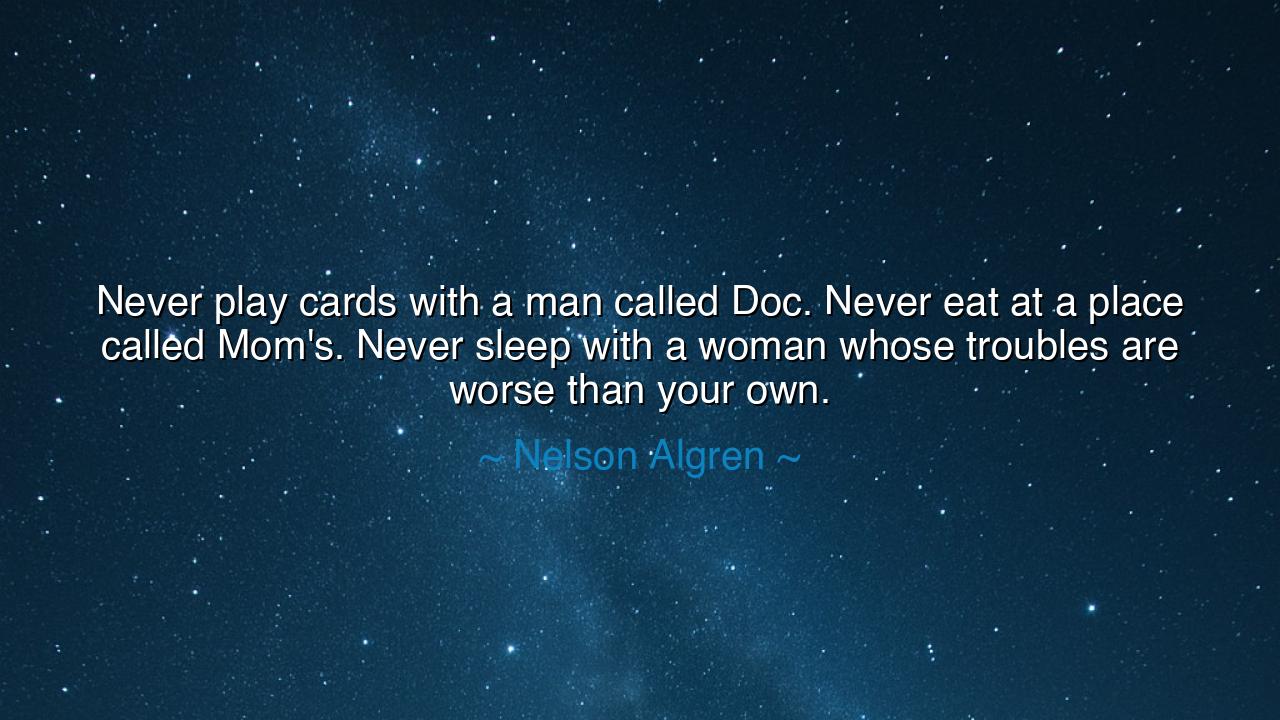
Never play cards with a man called Doc. Never eat at a place
Never play cards with a man called Doc. Never eat at a place called Mom's. Never sleep with a woman whose troubles are worse than your own.






“Never play cards with a man called Doc. Never eat at a place called Mom’s. Never sleep with a woman whose troubles are worse than your own.” — Nelson Algren
In this rough-hewn and timeless saying, Nelson Algren, the American chronicler of life’s underbelly, speaks not as a cynic, but as a sage of hard experience. His words, though wrapped in humor and grit, are born of the streets — of nights filled with smoke, betrayal, and the quiet ache of human folly. These three warnings are not rules of manners, but parables of self-preservation, whispered from one wanderer to another. Like the riddles of the ancients, they carry within their simplicity a map to wisdom: how to walk through a treacherous world and emerge with one’s heart, soul, and dignity intact.
“Never play cards with a man called Doc,” he says — a lesson carved from the cunning of survival. In every era, there are those who appear friendly, trustworthy, almost fatherly — yet who live by deception. A man called “Doc” in Algren’s world is not a physician, but a trickster; a man who has seen too much, knows too much, and hides his skill behind charm. The ancients might have called him Hermes, god of thieves and travelers, who smiled while he stole your purse. To play cards with such a man is to wager not only money, but pride. Algren teaches: Beware of those who make a living off other people’s trust. For in the game of life, the wise do not gamble with those whose hands are quicker than the eye, or whose hearts are colder than their smiles.
Then comes the second warning: “Never eat at a place called Mom’s.” This may seem a jest, but within it lies deep discernment. It speaks to the danger of illusion — of places or people that promise warmth, safety, and comfort, yet hide decay beneath the signboard of familiarity. The place called “Mom’s” pretends to be home, yet it is not home. It is a shadow of comfort, a mirage of sincerity. The ancients knew such deceit well: sirens who sang of love to lure sailors to the rocks, or inns that promised rest but offered ruin. Algren’s wisdom is this — do not be lulled by sentiment when judgment is needed. Even in the most welcoming light, see with clear eyes.
But it is the third line that pierces deepest: “Never sleep with a woman whose troubles are worse than your own.” Here, Algren’s voice turns from humor to sorrow. He speaks as one who has seen love turn to ruin when two wounded souls cling to each other not from strength, but from despair. To the ancients, this would be the wisdom of Solon or Aesop: that those drowning in their own storms cannot save another. To love is noble; to heal is divine; but to mistake pity for passion is to invite tragedy. The man who seeks refuge in another’s misery becomes entangled in it, until both are lost. Algren’s teaching is not cruel, but compassionate — it is the mercy of realism. He reminds us that to love wisely, one must first be whole enough to stand.
There is an echo here of the story of Odysseus, who, after years of wandering, meets Calypso — the immortal woman who offers him eternal comfort and escape from his pain. Yet he turns her down, for he knows that to stay with her would be to forget himself. Her love, born of loneliness, could not cure his longing; it would only delay his return to truth. So too does Algren warn against confusing rescue with redemption. Those whose troubles are greater than yours must first heal themselves — just as you must heal yourself — before love can flourish in balance.
In all three proverbs, we find the same undercurrent: wisdom through awareness. Algren’s is the wisdom of one who has walked among deceivers, dreamers, and broken souls, and learned to see the signs that others ignore. The man called “Doc” teaches us caution; the diner called “Mom’s” teaches discernment; the troubled lover teaches restraint. Together they form a trinity of survival — a guide not only for the streets, but for the spirit. The ancients would have called such sayings maxims of prudence, the kind that keep a traveler alive in a world of illusion.
Let this lesson be passed to all who listen: trust not the surface of things, but seek the truth that lies beneath. In your dealings with others, watch not only their words, but their hands and hearts. In your longing for comfort, ask whether what you seek is real, or only the echo of home. And in your loves, be kind — but never lose yourself in another’s chaos. Algren’s world may have been filled with gamblers, hustlers, and dreamers, yet his wisdom belongs to every age.
So remember, as the ancients might have carved into stone: The wise walk with open eyes. They know when to play, when to pass, and when to walk away. In this way, a person guards not only their fortune, but their soul.






AAdministratorAdministrator
Welcome, honored guests. Please leave a comment, we will respond soon